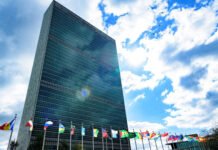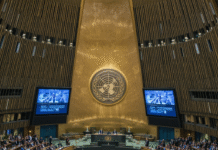The Threat of Nuclear Confrontations
The escalating confrontations among nuclear-armed states pose a significant threat to global security. This is underscored by a recent statement from a Russian representative at a disarmament committee, who highlighted the growing tensions and their potential implications. Contemporary geopolitical dynamics suggest that these nations, armed with nuclear capabilities, are increasingly reluctant to engage in constructive diplomatic dialogues. Such reluctance only serves to heighten the likelihood of confrontations and, by extension, could lead to catastrophic outcomes.
One prominent example illustrating these tensions is the ongoing conflict in Ukraine. The military actions taken by Western nations, particularly in support of Ukraine, are perceived by some nuclear-armed states, notably Russia, as provocative. This perception nurtures a sense of vulnerability and encourages aggressive posturing, thereby complicating the already precarious situation. The perception of threat can lead to an escalation in military readiness and vocal hostilities, consequently amplifying the risk of miscalculation that could inadvertently result in nuclear exchanges.
Moreover, the shift towards a multipolar world further complicates these dynamics. As more countries acquire nuclear capabilities or engage in alliances that bolster their military strengths, the landscape of international relations becomes fraught with increased uncertainty. The intricate web of alliances and enmities can cultivate conditions ripe for misunderstandings. A minor disagreement between two nuclear-armed states could spiral out of control without effective communication and trust, turning a regional conflict into a global crisis.
In essence, the lack of willingness to resolve tensions through diplomatic means not only increases the likelihood of nuclear confrontations but also poses a dire challenge for global stability. The implications of such confrontations must be recognized and addressed to mitigate the risks associated with nuclear escalation, as the impacts extend far beyond national borders and affect the entire international community.
Allegations and Counter-Claims: The Ukraine Conflict and Nuclear Rhetoric
The ongoing conflict between Russia and Ukraine has been accompanied by a complex narrative regarding the use of nuclear rhetoric and the perceived threats posed by both sides. Central to the tension are Russia’s claims that Western nations, particularly through their military support for Ukraine and NATO’s evolving posture, are exacerbating the conflict. Russian officials often assert that such actions are provocative, thereby contributing to a dangerous escalation that could lead to a broader confrontation, including the potential use of nuclear weapons.
In stark contrast, Ukraine has vehemently condemned the Russian government’s nuclear threats, interpreting them as intimidation tactics aimed at undermining Ukraine’s resolve. The rhetoric surrounding Ukraine’s sovereignty and the right to self-defense is intertwined with concerns over nuclear escalation. At various points, Ukrainian leaders have pointed to Russia’s military maneuvers and its nuclear posturing as direct threats not only to Ukraine but also to global security. These contrasting narratives create a formidable challenge for disarmament efforts, making the diplomatic landscape increasingly fraught.
Specific incidents during the conflict illustrate the risks associated with the current climate of nuclear rhetoric. For example, in past months, Russian military exercises that included nuclear components were strategically timed, prompting significant concern from NATO and its allies. Such actions have led to accusations that Russia is adopting a strategy of nuclear coercion. Conversely, claims from Russia that NATO’s presence in Eastern Europe poses an existential threat have further fueled this narrative, compelling both sides into a cycle of retaliatory claims.
Ultimately, these allegations and counter-claims reflect deeper issues within international relations, emphasizing the precarious balance between military strategy and diplomatic resolution in the shadow of nuclear capabilities. As both nations leverage nuclear rhetoric to justify their actions, the implications for global security remain profound, warranting a careful examination of communication and strategy in a nuclear context.
Global Responses to Nuclear Threats: Views from the International Community
The escalating tensions among nuclear-armed states have elicited varied responses from the international community, emphasizing the collaborative imperative to address nuclear threats comprehensively. During discussions at disarmament committees, countries such as Poland, France, Norway, and India articulated their positions, highlighting a spectrum of perspectives on the challenges posed by nuclear capabilities. A recurring theme across these statements is the condemnation of aggressive nuclear rhetoric, which is viewed as detrimental to global stability.
Poland, aligning with many other nations, has underscored the importance of diplomacy in effectively managing tensions related to nuclear arsenals. Polish representatives emphasized that the path to reducing the nuclear threat lies in fostering dialogue and cooperation among nations. In contrast, France has reiterated its strategy of maintaining a minimum deterrence doctrine while advocating for the necessity of multilateral disarmament initiatives. French officials argue that upholding nuclear deterrents must be balanced with a firm commitment to disarmament, highlighting the dual need for security and nuclear non-proliferation.
Norway’s perspective is significantly rooted in the humanitarian impacts of nuclear weapons, presenting a moral argument against their existence. Norwegian statements during disarmament discussions have called for urgent reformed measures that directly address the humanitarian consequences of nuclear conflict. Alternatively, India adopted a distinct stance, advocating for security while asserting its legitimate right to maintain a nuclear arsenal. Indian officials pointed out that security dynamics influence their nuclear policy, yet there remains an openness toward dialogue with other nations regarding disarmament protocols.
In summary, the discourse among various countries reveals a complex interplay of viewpoints on how to mitigate nuclear threats. The recurring calls for diplomatic solutions and reformed disarmament measures reflect a collective acknowledgment of the need to navigate the intricacies of nuclear-armed states to achieve enhanced global security.
Towards a Framework for Peace: Nuclear Disarmament as a Solution
The escalating tensions among nuclear-armed states underscore an urgent need for a comprehensive framework aimed at nuclear disarmament. This approach not only seeks to reduce the number of nuclear weapons but also aims to alleviate the overarching threat they pose to global security. Achieving a sustainable peace through nuclear disarmament necessitates an emphasis on international cooperation and dialogue, fostering a collaborative environment where nations can address their security concerns without resorting to military buildup.
A critical component of this disarmament strategy is the role of established treaties, particularly the Non-Proliferation Treaty (NPT). The NPT has served as a cornerstone for global efforts to prevent the spread of nuclear weapons and is essential in promoting a dialogue among nuclear and non-nuclear states. In addition to maintaining existing commitments under the NPT, it is vital to encourage both participating and non-participating states to engage in comprehensive discussions regarding nuclear arsenals. Treaties should evolve to reflect current geopolitical realities, addressing emerging security dynamics, including shifting alliances among nuclear-armed states.
Moreover, it is essential to promote non-discriminatory disarmament measures that do not disproportionately disadvantage certain nations while granting others the leeway to develop their nuclear capabilities. Establishing transparency in nuclear arsenals and developing verification mechanisms can significantly enhance trust among states, reducing fears of surprise attacks or covert nuclear programs. A unified approach that involves all stakeholders, including emerging powers with nuclear ambitions, is crucial for forging a path toward disarmament.
Ultimately, the pursuit of nuclear disarmament is not merely an idealistic endeavor; it is a pragmatic solution that can foster a stable international order. By prioritizing dialogue, collaboration, and inclusivity, the global community can work together to diminish the threats associated with nuclear weapons, contributing to a safer world for future generations.





